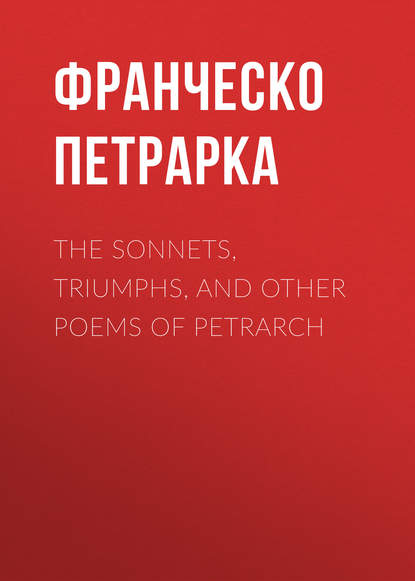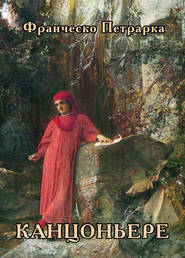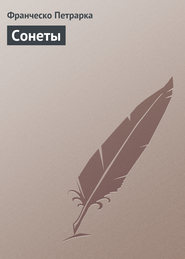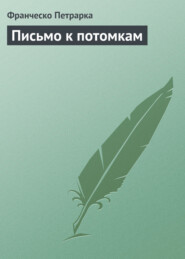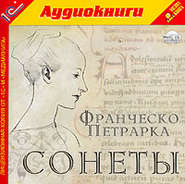По всем вопросам обращайтесь на: info@litportal.ru
(©) 2003-2025.
✖
The Sonnets, Triumphs, and Other Poems of Petrarch
Настройки чтения
Размер шрифта
Высота строк
Поля
The same sharp pains that first my ruin crown'd.
Then was my error when the old way quite
Of liberty was bann'd and barr'd to me:
He follows ill who pleases but his sight:
To its own harm my soul ran wild and free,
Now doom'd at others' will to wait and wend;
Because that once it ventured to offend.
Macgregor.
SONNET LXXVI
Ahi bella libertà, come tu m' hai
HE DEPLORES HIS LOST LIBERTY AND THE UNHAPPINESS OF HIS PRESENT STATE
Alas! fair Liberty, thus left by thee,
Well hast thou taught my discontented heart
To mourn the peace it felt, ere yet Love's dart
Dealt me the wound which heal'd can never be;
Mine eyes so charm'd with their own weakness grow
That my dull mind of reason spurns the chain;
All worldly occupation they disdain,
Ah! that I should myself have train'd them so.
Naught, save of her who is my death, mine ear
Consents to learn; and from my tongue there flows
No accent save the name to me so dear;
Love to no other chase my spirit spurs,
No other path my feet pursue; nor knows
My hand to write in other praise but hers.
Macgregor.
Alas, sweet Liberty! in speeding hence,
Too well didst thou reveal unto my heart
Its careless joy, ere Love ensheathed his dart,
Of whose dread wound I ne'er can lose the sense
My eyes, enamour'd of their grief intense,
Did in that hour from Reason's bridle start,
Thus used to woe, they have no wish to part;
Each other mortal work is an offence.
No other theme will now my soul content
Than she who plants my death, with whose blest name
I make the air resound in echoes sweet:
Love spurs me to her as his only bent,
My hand can trace nought other but her fame,
No other spot attracts my willing feet.
Wollaston.
SONNET LXXVII
Orso, al vostro destrier si può ben porre
HE SYMPATHISES WITH HIS FRIEND ORSO AT HIS INABILITY TO ATTEND A TOURNAMENT
Orso, a curb upon thy gallant horse
Well may we place to turn him from his course,
But who thy heart may bind against its will
Which honour courts and shuns dishonour still?
Sigh not! for nought its praise away can take,
Though Fate this journey hinder you to make.
For, as already voiced by general fame,
Now is it there, and none before it came.
Amid the camp, upon the day design'd,
Enough itself beneath those arms to find
Which youth, love, valour, and near blood concern,
Crying aloud: With noble fire I burn,
As my good lord unwillingly at home,
Who pines and languishes in vain to come.
Macgregor.
SONNET LXXVIII
Poi che voi ed io più volte abbiam provato
TO A FRIEND, COUNSELLING HIM TO ABANDON EARTHLY PLEASURES
Still has it been our bitter lot to prove
How hope, or e'er it reach fruition, flies!
Up then to that high good, which never dies,
Lift we the heart—to heaven's pure bliss above.
On earth, as in a tempting mead, we rove,
Where coil'd 'mid flowers the traitor serpent lies;
And, if some casual glimpse delight our eyes,
'Tis but to grieve the soul enthrall'd by Love.
Oh! then, as thou wouldst wish ere life's last day
To taste the sweets of calm unbroken rest,
Tread firm the narrow, shun the beaten way—
Ah! to thy friend too well may be address'd:
"Thou show'st a path, thyself most apt to stray,
Which late thy truant feet, fond youth, have never press'd."
Wrangham.
Friend, as we both in confidence complain
To see our ill-placed hopes return in vain,
Let that chief good which must for ever please
Exalt our thought and fix our happiness.
Then was my error when the old way quite
Of liberty was bann'd and barr'd to me:
He follows ill who pleases but his sight:
To its own harm my soul ran wild and free,
Now doom'd at others' will to wait and wend;
Because that once it ventured to offend.
Macgregor.
SONNET LXXVI
Ahi bella libertà, come tu m' hai
HE DEPLORES HIS LOST LIBERTY AND THE UNHAPPINESS OF HIS PRESENT STATE
Alas! fair Liberty, thus left by thee,
Well hast thou taught my discontented heart
To mourn the peace it felt, ere yet Love's dart
Dealt me the wound which heal'd can never be;
Mine eyes so charm'd with their own weakness grow
That my dull mind of reason spurns the chain;
All worldly occupation they disdain,
Ah! that I should myself have train'd them so.
Naught, save of her who is my death, mine ear
Consents to learn; and from my tongue there flows
No accent save the name to me so dear;
Love to no other chase my spirit spurs,
No other path my feet pursue; nor knows
My hand to write in other praise but hers.
Macgregor.
Alas, sweet Liberty! in speeding hence,
Too well didst thou reveal unto my heart
Its careless joy, ere Love ensheathed his dart,
Of whose dread wound I ne'er can lose the sense
My eyes, enamour'd of their grief intense,
Did in that hour from Reason's bridle start,
Thus used to woe, they have no wish to part;
Each other mortal work is an offence.
No other theme will now my soul content
Than she who plants my death, with whose blest name
I make the air resound in echoes sweet:
Love spurs me to her as his only bent,
My hand can trace nought other but her fame,
No other spot attracts my willing feet.
Wollaston.
SONNET LXXVII
Orso, al vostro destrier si può ben porre
HE SYMPATHISES WITH HIS FRIEND ORSO AT HIS INABILITY TO ATTEND A TOURNAMENT
Orso, a curb upon thy gallant horse
Well may we place to turn him from his course,
But who thy heart may bind against its will
Which honour courts and shuns dishonour still?
Sigh not! for nought its praise away can take,
Though Fate this journey hinder you to make.
For, as already voiced by general fame,
Now is it there, and none before it came.
Amid the camp, upon the day design'd,
Enough itself beneath those arms to find
Which youth, love, valour, and near blood concern,
Crying aloud: With noble fire I burn,
As my good lord unwillingly at home,
Who pines and languishes in vain to come.
Macgregor.
SONNET LXXVIII
Poi che voi ed io più volte abbiam provato
TO A FRIEND, COUNSELLING HIM TO ABANDON EARTHLY PLEASURES
Still has it been our bitter lot to prove
How hope, or e'er it reach fruition, flies!
Up then to that high good, which never dies,
Lift we the heart—to heaven's pure bliss above.
On earth, as in a tempting mead, we rove,
Where coil'd 'mid flowers the traitor serpent lies;
And, if some casual glimpse delight our eyes,
'Tis but to grieve the soul enthrall'd by Love.
Oh! then, as thou wouldst wish ere life's last day
To taste the sweets of calm unbroken rest,
Tread firm the narrow, shun the beaten way—
Ah! to thy friend too well may be address'd:
"Thou show'st a path, thyself most apt to stray,
Which late thy truant feet, fond youth, have never press'd."
Wrangham.
Friend, as we both in confidence complain
To see our ill-placed hopes return in vain,
Let that chief good which must for ever please
Exalt our thought and fix our happiness.





